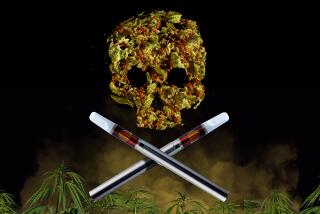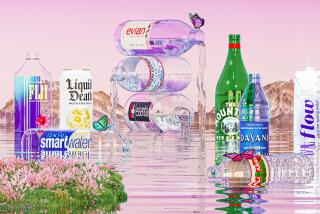Bottled washes to clean food? Water’s fine
- Share via
For consumers worried about E. coli on their cantaloupe or pesticides on their peaches, there’s a new form of alleged assistance on grocery store shelves: bottled washes that promise to remove pesticide residues, wax, dirt and bacteria from fruit and vegetables.
Given the recent string of nationwide outbreaks linked to produce -- salmonella on peanuts earlier this year, salmonella on jalapeno peppers last year, and E. coli O157:H7 on spinach in 2006 -- the antibacterial claims may be particularly alluring: A growing number of washes bearing such claims have arrived on the market in recent years.
But are these products necessary, and do they work?
Veggie Wash, Fit Fruit and Vegetable Wash, Bi-O-Kleen Produce Wash, Earth Friendly Products Fruit & Vegetable Wash and Eat Cleaner All Natural Food Wash and Wipes are some of the washes on store shelves. The precise contents vary, but produce washes typically contain some sort of surfactant, a cleansing agent that loosens dirt and breaks down oil, as well as ingredients intended to help kill germs, such as citrus oils, citrus acids or salts.
Unlike dish soap or other soaps, produce washes contain food-grade ingredients, so that they’re safe to consume in residual amounts.
But though they are safe themselves, there’s little evidence yet that they make produce any safer.
One wash -- Fit -- cites data on its website showing it is as good as chlorine solution at eliminating E. coli, salmonella and listeria pathogens from produce such as tomatoes, radishes, alfalfa sprouts and lettuce.
Another, Eat Cleaner, commissioned independent labs to test its product and found that it removed 99.9% of the E.coli and salmonella bacteria on produce.
But so far, the studies on washes have all been conducted or commissioned by the companies that make the products, says Sandra McCurdy, extension food safety specialist in the School of Family and Consumer Sciences at the University of Idaho in Moscow, Idaho. And their scientific methodology isn’t entirely clear, she says.
McCurdy adds that most produce is pathogen-free because it’s been washed during processing and because handlers take steps to avoid contaminating the fruits and vegetables they stock in the produce aisle. But if it is not, a thorough rinse under water is usually all that’s needed to remove most pathogens.
Bacteria in plants
On rare occasions, bacteria can get taken up into the tissue of a plant, as scientists suspect may have happened during the 2006 E. coli outbreak associated with spinach. In such instances, produce washes won’t help.
“If the bacteria get into the tissue during processing, it’s too late, it’s trapped in the tissue,” says Michael Doyle, professor and director of the Center for Food Safety at the University of Georgia in Griffin, Ga. (Doyle developed an antimicrobial technology that was licensed earlier this year by the makers of Fit produce wash.)
Many wash manufacturers also claim their products will remove waxes that trap dirt, germs and pesticides. But in fact, the waxes on fruits and vegetables serve as protection from bacteria as well as mold that can cause rot, McCurdy says, so it’s better not to wash produce until you’re about to eat it.
As for pesticides, there’s little scientific evidence to support claims that washes do a better job than water when it comes to removing them, says Anne Riederer, a professor of environmental and occupational health at Emory University in Atlanta, Ga.
“Any kind of washing, including just plain water, would probably remove most pesticides,” Riederer says. Riederer adds that most fruits and vegetables sprayed with pesticides contain residues of the chemicals within their tissue, which no amount of washing would remove.
According to the U.S. Department of Agriculture Pesticide Data Program, which tests samples of fresh and processed foods for pesticide residues every year, less than 1% of products contained unsafe levels of pesticide residues in 2007, the most recent year for which data are available. Testing also shows that the residues that do remain on produce -- albeit at levels considered safe by the agency -- are of numerous kinds. Residues of several dozen pesticides were often found on a single fruit or vegetable.
Cleaning helps
“Some are soluble in water, some are not, and they all contain inert ingredients” whose chemical properties are unknown, says Brian Hill, staff scientist at Pesticide Action Network North America, a San Francisco-based nonprofit organization. “It’s certainly good to wash these off, but it’s hard to say if a wash would be successful.”
In all likelihood, McCurdy says, there’s no harm in using produce washes. They may even do some good, although that’s not known. If they do, this may be of particular help for the very young, the elderly and the immunocompromised, Doyle adds. “These folks are explicitly sensitive to food-borne infections, so it’s important that extra precautions are taken for them,” he says.
McCurdy, who has tried produce wash at home, says, “I wouldn’t recommend it, because I don’t think at this time we have the data to support the claim that it’s going to make a difference.” However, she does understand why people like the products: It might make them feel that something’s cleaner. “I used it to wash bird poop off a plum I got from the farmers market -- and I did feel better than if I had just washed it with water.”
--
More to Read
Eat your way across L.A.
Get our weekly Tasting Notes newsletter for reviews, news and more.
You may occasionally receive promotional content from the Los Angeles Times.







